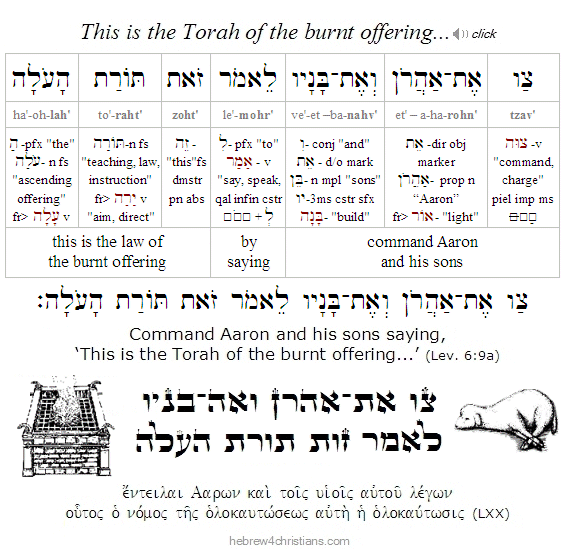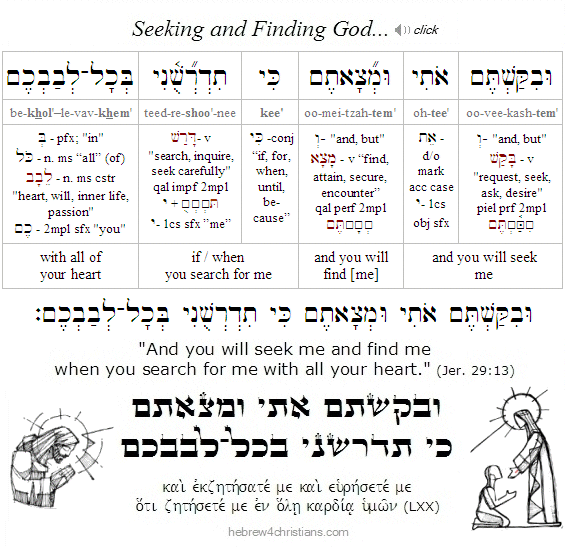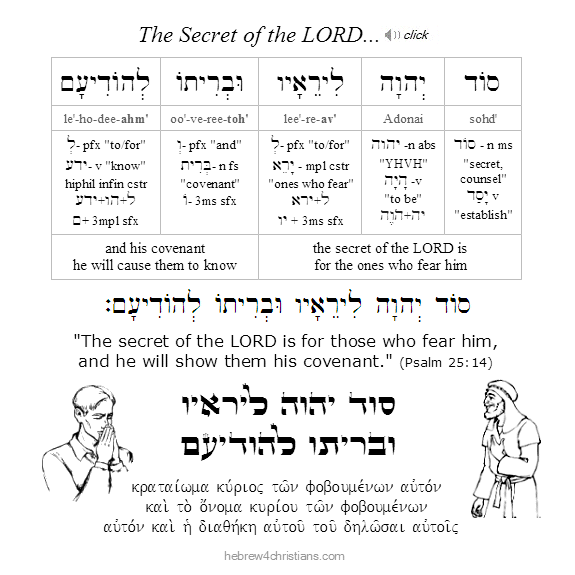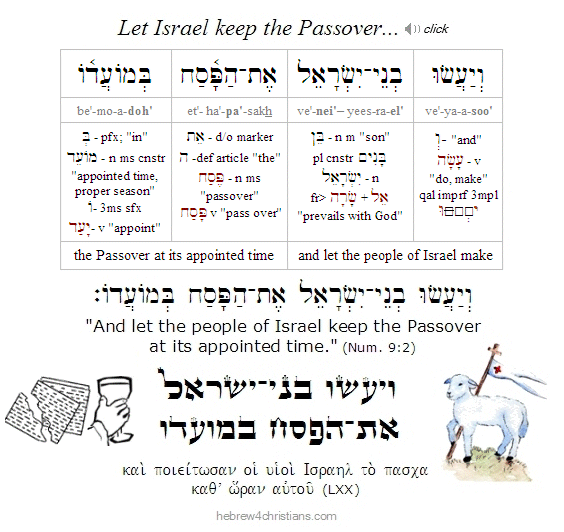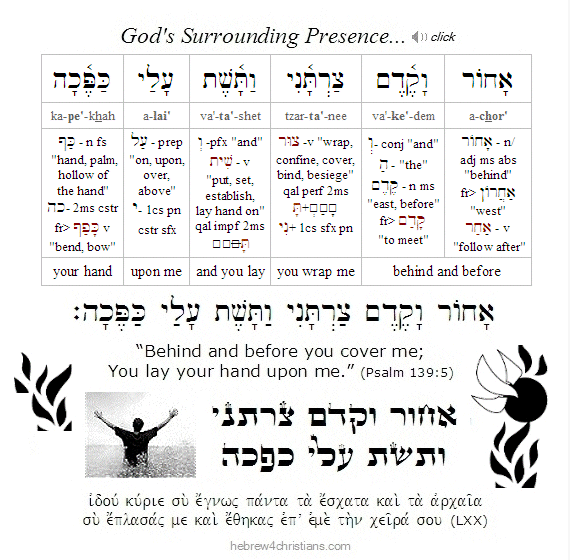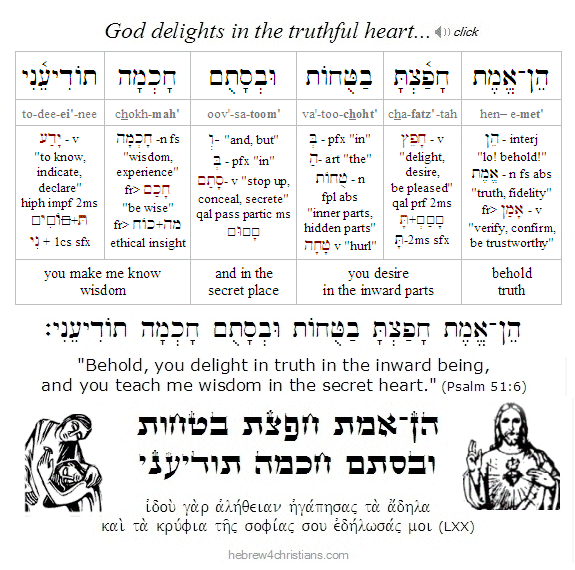|
April 2025 Updates (continued)
Note: If any page content appears to be missing, please refresh the page...
The Sabbath before Passover...

04.06.25 (Nisan 8 5785) The Sabbath that immediately precedes the holiday of Passover is called the "Great Sabbath" (i.e., Shabbat HaGadol: שבת הגדול), in honor of the time when the Israelites set aside the lamb for the Passover Sacrifice (i.e., korban Pesach: קרבן פסח).
During the time of the Temple it was customary to obtain the Korban Pesach (i.e., Passover lamb) four days before Passover so that worshipers could make sure that their lambs had no blemishes which would preclude them from being offered as sacrifices. This was done to fulfill the instructions given in Exodus 12 that the lamb for Passover be "without spot or blemish." Interestingly, this period of time allowed time for each family to become personally attached to their lamb, so that it would no longer simply be "a lamb" (Exod. 12:3) but rather their lamb" (Exod. 12:5). Indeed the Torah refers to "the" Lamb of God, as if there was only one: "You shall keep it [i.e., the Passover lamb] until the fourteenth day of this month, when the whole assembly of the congregation of Israel shall slaughter him (אתוֹ) at twilight (Exod. 12:6). Note that the direct object "him" (i.e., oto) can be read as Aleph-Tav (את) combined with the letter Vav (ו), signifying the Son of Man who is First and Last.
![Spring Holiday Timeline (H4C]](../../../../../About_HFC/Site_News/Archive-2025/April/April_2025_H4C_Overflow/shabbathagaolline.gif) |
Shabbat HaGadol foreshadowed the offering of Yeshua as the "Lamb of God" who takes away the sins of the world. The New Testament notes that it was a few days before Passover when Yeshua made His triumphant entry into Jerusalem riding on a donkey, signifying His Messiahship, in fulfillment of the prophecy of Zechariah: "Rejoice greatly, O daughter of Zion! Shout aloud, O daughter of Jerusalem! Behold, your king is coming to you; righteous and having salvation is he, humble and mounted on a donkey, on a colt, the foal of a donkey" (Zech. 9:9). During this time, when the pilgrims had come to select the lamb for the Passover sacrifice - they saw Yeshua and cried out: hoshiah na (הושׁיעה נא), meaning "please save" or "save now" (in English this phrase was translated from the Latin to form "Hosanna!"). The people spontaneously began singing Psalm 118:25-26 in anticipation of the fulfillment of the great Messianic hope.
Hebrew Lesson
Psalm 118:25-26 Reading (click for audio):
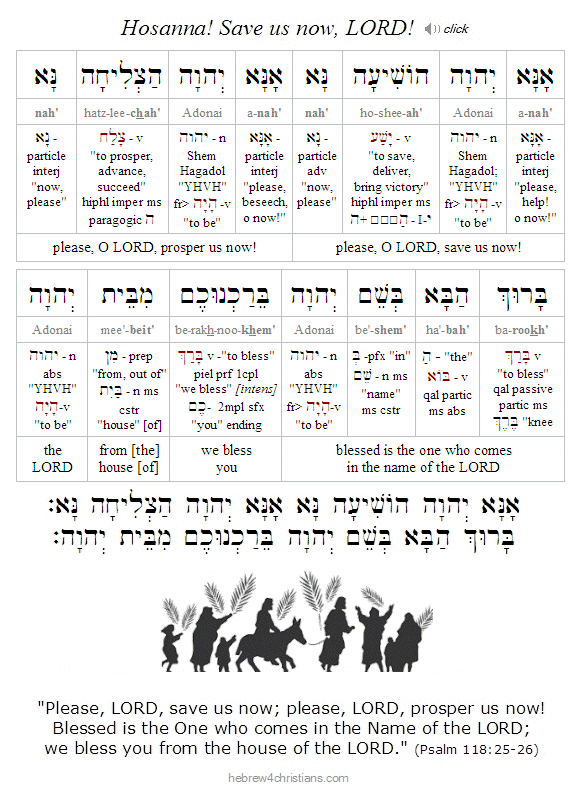 |
The Haftarah for Shabbat HaGadol (Malachi 3:4-24) foretells of Yom Adonai (יוֹם יהוה), the great Day of the LORD, and the return of Yeshua as Mashiach ben David. May that day come soon, chaverim. For more information, click here.
Ordained by the Lamb:
Parashat Tzav - פרשת צו
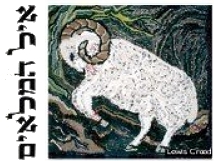
Every year we read Parashat Tzav before the holiday of Passover...
04.06.25 (Nisan 8 5785) Our Torah reading for the Sabbath just before Passover (i.e., Shabbat HaGadol) is called "parashat Tzav," where we learn that the first priests of Israel were ordained for their service by the blood of the lamb. First Aaron and his sons were washed with water, arrayed in priestly garments, and anointed with holy oil. During this ordination ceremony, a sin offering and burnt offering were offered on their behalf, and then a special "ram of ordination" (i.e., eil ha-milu'im: איל המלאים, lit. "ram of abundance [מָלֵא]") was slaughtered. Some of this ram's blood was applied to the right ear, right thumb, and big toe of the Aaron and his sons (a picture of Yeshua as our suffering High Priest), and the rest of the blood was dashed upon the sides of the altar. After its slaughter, Moses took some unleavened bread and put it in the hands of the priests to perform tenufah (a wave offering) before the altar (a picture of the resurrection).
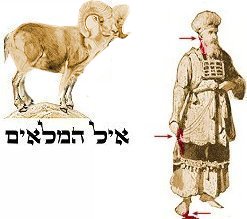 |
As followers of Yeshua, we too have been anointed with the blood from the "Ordained Lamb" -- Yeshua as our Kohen Gadol of the better covenant (Heb. 8:6). And we too have been anointed with the sacred shemen (oil) that symbolizes the presence and aroma of the LORD in our lives. As followers of Yeshua we are therefore truly "...a chosen race, a royal priesthood, a holy nation, a people for his own possession, that you may proclaim the excellencies of him who called you out of darkness into his marvelous light" (1 Peter 2:9). As Yeshua said: "You did not choose me, but I chose you and appointed you that you should go and bear fruit and that your fruit should abide, so that whatever you ask the Father in my name, he may give it to you" (John 15:16). May the God of Israel be pleased to help you serve Him in the truth...
Seeing Him who is Invisible...
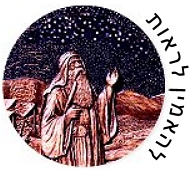
"We know that if God should put to the test our faithfulness to him, we know well that at the moment of testing, he himself must hold on to us, that is, we know that at bottom we are unfaithful, and that every instant it is he who at bottom holds us." - Kierkegaard
04.04.25 (Nisan 6 5785) "But you, when you pray, go into your room, and when you have shut your door, pray to your Father who is in the secret place; and your Father who sees in secret will reward you openly" (Matt. 6:6). Yeshua was not impressed with outward shows of spirituality or religion (Matt. 15:8). The rabbis called for public displays of repetitive prayers, but Yeshua taught that true prayer is a matter of intimate passion within the heart, and that the most powerful intercessions were made with ruach ha'koshesh - "groanings that cannot be uttered"(Rom. 8:26).
Instead of reciting prayers for the sake of ceremony or man's approval, he instructed us to pray "secretly" to our Father who "sees in secret" (ὁ βλέπων ἐν τῷ κρυπτῷ). Indeed, Yeshua taught that the LORD is "τῷ ἐν τῷ κρυπτῷ," the one who is in the "secret place," that is, hidden from outward forms, and that is why he himself came in disguise (Isa. 53:2). Since there is no merit in begging God for help, the Father rewards those who pray in their brokenness and poverty of heart, and his reward is revealed divine grace expressed openly - "ἐν τῷ φανερῷ" - unhidden to heart of faith (Deut. 29:29; Dan. 2:22). "He who dwells in the secret place of the Most High Shall abide under the shadow of the Almighty" (Psalm 91:1).
"By faith Moses forsook Egypt, not fearing the wrath of the king: for he endured, as seeing Him who is invisible" (Heb. 11:27). Ἐν τῷ κρυπτῷ - God both is, and sees, "in secret." He is in secret because he dwells in unapproachable light, whom no one has ever seen or can see" (1 Tim. 6:16), and yet he calls us to believe in the light, to walk in the light, and to be children of light (John 12:36; 1 John 1:7). We see the light in the teaching of Yeshua, by means of the Holy Spirit, though we see through a glass darkly, by analogy and riddle (1 Cor. 13:12). Some things are clear to us in this life, but much awaits to be revealed (1 John 3:2). "I have many more things to say to you, but you cannot bear them now" (John 16:12), though the Holy Spirit will give enough illumination for us to know the truth that sets our hearts free (John 16:13). "The secret of the LORD is for those who fear him, and he will show them his covenant" (Psalm 25:14).
But why does God hide this way? And why does he attend to that which is hidden or concealed (Heb. 4:13). The eye of faith sees the "invisible" things, the unseen blessing that lies behind the phenomenal realm of existence (Heb. 11:27). As Blaise Pascal said, "there is enough light for those who want to believe, and enough shadows to blind those who don't." In this present world, God "hides" so that people may seek him, for once he openly reveals his Presence, there is no longer the issue of faith (Rom. 8:24).
This is part of the "mysteries of the kingdom" (τὰ μυστήρια τῆς βασιλείας), after all (Matt. 13:10-15) which presents a "two-tiered" reality, the heavenly realm of God's Presence, and the earthly realm of transience. Upon reflection we may sometimes feel lonely and bewildered in this duality, not knowing how to "mediate" or bring together the opposite poles of our experience... On the one hand life in this present world is fading away, and finitude, dissolution, and the "dust of death" seem omnipresent to our physical senses, nevertheless our hearts yearn for eternity, for unending life, and God's presence and the manifestation of everlasting significance. We long for meaning, wonder, greatness, and the peace of unconditional love, yet we find ourselves trapped within a diseased and moribund world that is filled with thwarted dreams, painful losses, harrowing vexations, and death... We hunger and thirst for real life, for salvation from our misery, but the cosmological visions of mechanistic science reveal an immense emptiness that has no goal or end, no explanation for its existence, and therefore no meaning or real hope.
God hides so that we will seek him (Jer. 29:13). This seeking involves all our heart, since we will not seek God until we understand the inner crisis. It is not enough to know right words of theology, since we must learn to think the right way, and this comes at the cost of struggle, wrestling, and testing. We cannot rely on reason alone to guide us, for that relegates beauty, mystery, and hope into oblivion; nor can we dismiss reason, for then faith becomes absurd and ridiculous. We must find a delicate balance: "faith seeking understanding," knowing when it is right to question, to doubt, and to analyze, and when it is right to affirm, to submit, and to surrender. Reason is a servant of something more fundamental, namely the heart or the will; it is activated at the stir of the soul's desire.
Hebrew Lesson
Jer. 29:13 reading (click):
The dualism of life shows up within our hearts as well, as we wrestle with our own faith and with "double-mindedness," that is, the ambivalence that results from not having our minds made up. On the one hand, we need to confess the truth of our radical sinfulness, our depravity, our brokenness, and so on, while on the other we must learn to know ourselves as the "beloved" and to find faith that God's blessing indeed belongs to us -- that Yeshua gave his life for us -- despite ourselves. We have to be willing to take God's new name for us and believe that God has transformed our deepest nature for eternal good. We have to be renamed from "Jacob" to "Israel," and yet we know ourselves as both... In other words, we must learn to "put on" the new nature and to "put off" the carnal reasoning of our former life. The answer for us is found in the word "miracle," as God in great mercy and compassion regenerates us, comforts us, and then guides our way back to the truth of his salvation.
Hebrew Lesson
Psalm 25:14 reading (click):
The Torah of Passover...
The holiday of Passover (i.e., Pesach) begins Saturday, April 12th at sundown this year...
04.04.25 (Nisan 6 5785) All of the Biblical holidays (חגי תורה) begin with the primordial holiday of Passover (חג הפסח), which has its origins in the original sacrifice of the lamb and the promise of redemption given to Adam and Eve in garden of Eden...
The original sacrifice and promise was reenacted in the redemption of the Jewish people in Egypt. On the first of Nisan, two weeks before the great Exodus, God showed Moses the new moon and commenced the divine calendar. Two weeks later, the Israelites kept the Passover by daubing the blood of the lamb on their doorposts. At the stroke of midnight of Nisan 15 God sent the last of the ten plagues on the Egyptians, killing all their firstborn. Later that morning the people began their march to the promised land.
A week into the journey, the Egyptian army caught up with the Israelites as they were trapped before the sea, but God split the waters and the people passed through. When the Egyptian army pursued after them the following morning, they perished in the waters that closed in over them. The climactic event of crossing the sea is remembed as the summary of the Exodus, and Unleavened Bread is eaten during the seven days in honor of this time...
On the third new moon after leaving Egypt (i.e., the 1st day of the month of Sivan), the Israelites encamped opposite Mount Sinai, the place where Moses was initially commissioned. On the 6th of Sivan, exactly seven weeks after the Exodus (49 days), Moses first ascended Sinai to receive the tablets of the commandments and the vision of the altar (Shavuot). Forty days later, on the 17th of Tammuz, the people worshipped the golden calf and the tablets were shattered. Moses then interceded for Israel for another forty days until he was called back up to Sinai on Elul 1 and received the revelation of the Name (YHVH). After this, he descended with a second set tablets and returned to the camp on Tishri 10, which later was called Yom Kippur, or the "Day of Atonement." The holiday of Sukkot ("Tabernacles") was later instituted to commemorate God's care for the people as they trekked through the desert.
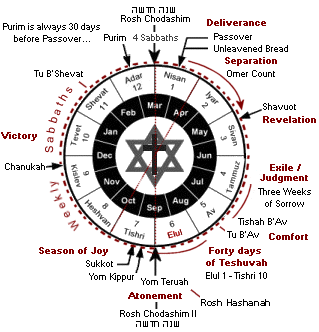 |
In addition to being commemorated every year during Passover (Exod. 12:24-27; Num. 9:2-3; Deut. 16:1), the Exodus from Egypt (סיפור יציאת מצרים) is explicitly mentioned in the very first of the Ten Commandments (Exod. 20:2), and it is recalled every Sabbath day (Deut. 5:12-15). The festivals of Shavuot ("Pentecost") and Sukkot ("Tabernacles") derive from it (the former recalling the giving of the Torah at Sinai and the latter recalling God's care as the Exodus generation journeyed from Egypt to the Promised Land). Indeed, nearly every commandment of the Torah (including the laws of the Mishkan (i.e., "Tabernacle") and the sacrificial system) is traced back to the story of the Exodus. Most importantly, the Exodus prefigures and exemplifies the work of redemption given through the sacrificial life of Yeshua the Messiah, the true King of the Jews and the true Lamb of God (שׂה האלהים). Indeed, the crucifixion of Yeshua and his resurrection from the dead is the "greater Exodus" given by the Messiah, the most fundamental event of all human history (Luke 9:31).
Notice something very important, friends. The very first occurrence of the word "Torah" (תורה) in the Scriptures refers to the obedient faith of Abraham (Gen. 26:5), and the second occurrence refers to the law of Passover: "There shall be one law (תורה אחת) for the native and for the stranger who sojourns among you" (Exod. 12:49). There is a link between these two occurrences. Abraham lived before the time of the Exodus, of course, and therefore he obeyed the law of Passover by means of the Akedah (the sacrifice of his "only begotten" son Isaac). Despite offering his son up upon the altar at Moriah, Abraham believed in the LORD and it was credited to him as tzedakah (righteousness). Abraham's obedience revealed that the inner meaning of Torah is that the "righteous shall live by faith" (Hab. 2:4, Rom. 1:17). The Torah of Passover (תורת הפסח) likewise teaches that redemption from death is possible through the exchange of an innocent sacrificial victim. The blood of the Passover was "a sign" of imputed righteousness that was obtained entirely by faith. This is the "korban" principle of "life-for-life" that underlies the Torah of the sacrificial system of the Tabernacle as well.
Ultimately all Torah points to Yeshua, who is the divinely appointed Redeemer and the beginning and goal of all of creation... "When the fullness of time (τὸ πλήρωμα τοῦ χρόνου) had come, God sent forth his Son, born of woman, born under the Torah, to redeem those under the Torah, so that we might receive adoption as sons" (Gal. 4:4-5).
Hebrew Lesson
Numbers 9:2 Hebrew reading:
Related Topics for Passover:
Teshuvah and Despair...
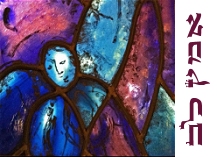
04.04.25 (Nisan 6 5785) There are moments – dark, gnawing, raw – when you may lose sight of hope, when you might even fear that you have lost your faith – not in God or his promises – but rather in yourself, in your own strength to continue, to stay focused, to keep pressing on "hope against hope..." The remedy here is always the same: to remember that within you – that is, in your flesh - "there is no good thing" and that the miracle of salvation is made secure by God's passion for you, not your own power or desire. "Not by might, nor by power, but by my Spirit, saith the LORD of Hosts" (Zech. 4:6).
We don't trust in ourselves nor in the strength of our inner resolve, but solely in the power of God to make the way and who gives life from the dead (John 1:13; 2 Cor. 3:5). We must turn away from ourselves to regain the message of God's unfailing love; only when we lose sight of ourselves do we find ourselves. God redeems you from your lost estate and touches you in your uncleanness; He clothes himself in your pain so that you may be clothed in his love. That never changes, despite dark moments, and to that we must always return...
Hebrew Lesson
Zechariah 3:6 reading (click):
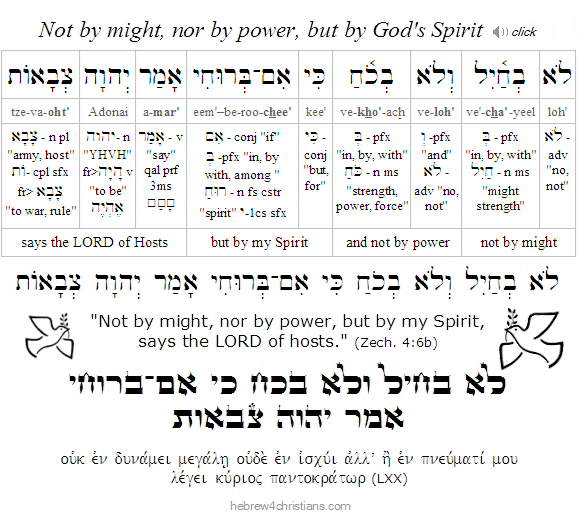 |
Where it says, "I can do all things through Messiah who strengthens me" (Phil 4:13), that includes being healed of the inner pain of your life: your failures, your shame, the ache of rejection, abandonment, and so on. It means being set free from disillusionment, despair, and the oppression of relentless fear. "I can do all things through Messiah" means no longer accepting messages of self-hatred and hopelessness, no longer heeding the malicious whispers that say: "I am of no value," "I am unlovable," "my life is hopeless." No, "I can do all things through Messiah" means learning to be accepted, honored, and esteemed by God; it means opening your heart to God's love and blessing for your life; it means allowing your heart to be made right, to have inner peace... After all, Yeshua's great prayer was that we would know the truth of God's love for us (John 17), and this is the central need our lives. Amen, and may we walk in that love today...
Sacrifice and Holiness...

04.03.25 (Nisan 5 5785) The book of Vayikra (i.e., Leviticus) presents two "overarching" themes. The first concerns the system of sacrifices (i.e., korbanot: קָרְבָּנוֹת) that were to be arranged in the Mishkan (and later, at the Temple). These include the daily sacrifice of the lamb (קָרְבַּן תָּמִיד), sacrifices for guilt and sin, thanksgiving offerings, and so on. The culmination of the sacrificial system, however, was expressed by the elaborate Yom Kippur service that was performed to obtain "kapparah" (כַּפָּרָה), or atonement for the people.
The second overarching theme of the book of Vayikra concerns matters of personal holiness (i.e., kedushah: קְּדוּשָׁה), including laws regarding what is "clean" (i.e., tahor: טָהוֹר) and "unclean" (i.e., tamei: טָמֵא) in matters of diet, sexual relations, personal health, and so on. In addition, holiness is connected with social relationships, such as the duty to honor parents, to give tzedakah (charity) to the needy, and to refrain from doing any harm to others. Indeed, the Ten Commandments are restated in Vayikra beginning with the words "You shall be holy, for I the LORD your God am holy" (Lev. 19:1-2). Note, incidentally, that the order of the commandments appears differently in Leviticus 19 than what is written in Exodus chapter 20 (and also in Deuteronomy chapter 5), and that additional commandments are listed there as well.
These two major themes - sacrifice and holiness - are connected, though perhaps not in the way you might immediately think. Many people suppose the sacrifices were given as a ritual means of obtaining pardon for sin, but this is an oversimplification. The Hebrew prophets did not add or subtract from the laws given at Sinai, though they sometimes criticized the people for offering sacrifices without the desire to obey God's law. The sacrifices themselves were not the problem, but they were ineffectual apart from genuine teshuvah (see 1 Sam. 15:22-31; Hos. 6:6; Matt. 12:7; Prov. 21:3; Isa. 1:11. Micah 6:6, Jer. 7:22).
The point here is that offering sacrifice apart from a heart of obedience is meaningless mummery and ostentation, since the moral law of God was given first to the people and only afterward were the sacrifices described to Moses in the vision of the altar at Sinai. But it is obedience to God that imparts virtue to sacrifice, as the cross of Yeshua exemplifies.
The idea of sacrifice predates the giving of the law given at Sinai, of course, and goes back to the primordial Garden of Eden itself where God offered up the lamb for Adam and Eve's transgression (Gen. 3:21). This set the pattern, and later Adam brought sacrifice, as did Cain, Abel, Noah, Shem, Abraham, Isaac, Jacob, and Moses.
We can learn from the account of Cain and Abel about righteous sacrifice. First note that Abel presented to God a sacrificed lamb - recalling the original sacrifice of God and the promise of the redemption to come given to Adam and Eve (Gen. 3:14-15) - whereas Cain offered fruits of the earth. Their respective sacrifices present a study in contrasts, as God "turned to Abel and his offering" but he did not so regard Cain's offering. In a sense Abel (הֶבֶל), whose name comes from "vanity" or "vapor" (הָבַל) "re-presented" God's offering of the lamb that covered the sin of his parents, having faith in the promise of the Redeemer who was to come, whereas Cain (קַיִן) whose name means "to get" or to "take" (קָנָה), simply returned the gift of the fruits of the garden. Now there is of course nothing wrong with offering "first fruits" to God as minchah (מִנְחָה), or a gift, but God was looking for Cain to have faith in his promise. When God saw that Cain felt dejected, He rhetorically asked: "If you do well, will you not be accepted?" which indicates that being accepted is a matter of earnest faith in God, for that is what "doing well" truly means in the eyes of heaven. The Lord's words to Cain teach us that the basis for offering sacrifice to God is to express faith in his healing love and salvation...
This principle is essential to all true Torah: Those who trust in God's promises find divine blessing, as the LORD said to aged Abraham when he gazed upon the canopy of stars and believed the "impossible" promise that he would become the father of a multitude of people. Yet Abraham trusted God for the miracle: "And he (Abraham) believed in the LORD; and he (the LORD) counted it to him for righteousness" (Gen. 15:6). Abraham believed in God's righteousness -- his blessing, power, and lovingkindness -- that would fulfill the vision, certainly not in his own merit or strength.... This is the very first commandment, after all, namely to believe in the Lord as your Savior, Healer, Blessing, Life, Destiny, and so on. "I AM the LORD your God" (אָנֹכִי יְהוָה אֱלֹהֶיךָ) is the first word of faith (Exod. 20:2).
We have to be careful about what we think makes us right with God. Do we trust in ourselves or in God for our righteousness? Abel saw the vanity of human effort to attain righteousness, whereas Cain sought to acquire it through his own effort. The Holy Temple was destroyed because false religion offered sacrifices as a way to excuse their sin and consequently to disregard the call to turn to God and live a life of holiness. Walking by faith means understanding the sanctity of life itself, to accept that we are called by God to be set apart to know Him in all our ways (Prov. 3:5-6). Offering a sacrifice as "payment" for sin misses the point. True holiness means being "separated" from the profane to know and love God, but too often religion can serve as a false god that promotes sin by promising forgiveness apart from the need to walk in the obedience of faith. Therefore God said through the prophet Hosea: "I desire goodness and not sacrifice" (Hos. 6:6). "Sacrifice" from a faithless person is an abomination to God (Isa. 1:11; Amos 5:21; Prov. 15:8).
The two great themes of sacrifice and holiness are therefore connected by faith in God's promises, and there can be no true sacrifice apart from heartfelt faith. Indeed, this is the ultimate purpose of the sacrifices - to honor God's heart and redeeming love given in Yeshua, the great Lamb of God (John 1:29; 1 Cor. 5:7). The blood of "bulls and goats" could never take away sin, but the sacrifice of God given of his own love for us does, and that is the message of the cross (Heb. 10:4-10). The sacrificial system with the daily offering of the lamb foreshadowed the Substance of the promise fulfilled in Yeshua. It is not our sacrifice that is the focus, but God's sacrifice of Christ given on our behalf, and our only response to this exceedingly precious gift is to offer thanks for God's kindness and mercy. "It is the kindness of God that leads you to repentance" (Rom. 2:4). As it written, "Through Him (i.e., the sacrifice of Yeshua) let us then continually offer up the sacrifice of praise to God, that is, the fruit of lips that confess the truth of his Name" (Heb. 13:15). Amen.
Hebrew Lesson
Psalm 9:10 Hebrew reading (click):
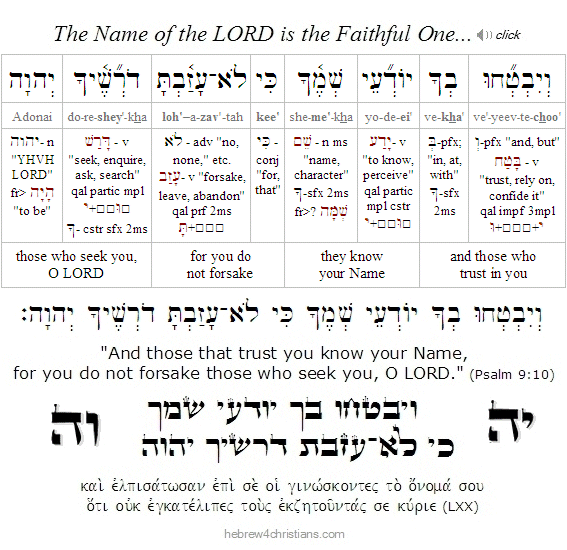 |
Your Life is from God...

"God abides for ever in an eternal present, His knowledge, also transcending all movement of time, dwells in the simplicity of its own changeless present." - Boethius
04.02.25 (Nisan 4 5785) The name of the Lord is YHVH (יהוה), which comes from a root word meaning existence (i.e., hayah: היה, to be). It is this name that gives existence to creation, as it says, "in him all things hold together" (τὰ πάντα ἐν αὐτῷ συνέστηκεν; Col. 1:17) and by his power "all things are carried" (φέρων τε τὰ πάντα; Heb. 1:3). Relative to our consciousness, the name is also connected with time: God is LORD hoveh (הוה), hayah (היה), and yihyeh (יהיה); He is the one who is, and who was, and who will forever be, the LORD over all possible worlds, and therefore He is rightly called the faithful God (יהוה הנאמן), since his promise and his will infallibly sustains all states of being. This implies that there never was nor ever shall be a moment of your life that was not given to you from God.
God is the LORD over the "eternal present" and therefore he is Yah hoveh (יָה הֹוֶה). In God we "live and move and have our being" (Acts 17:28) and "from him and through him and to him are all things" (Rom. 11:36). Some people think of "eternal life" as unending life or immortality of the soul, but eternal life (i.e., chayei olam: חַיֵּי עוֹלָם) transcends the idea of time and is centered in relation to the Living God, right now, wherever we are... Therefore Yeshua says to his followers, "Live in me and I will live in you" (John 15:4). We need not fear death, then, because we partake in the overcoming life of God given in Yeshua: there is no ultimate separation from his love. We have the "now" covenant with our Lord forever!
When we live in Messiah our true life is "concealed" and we pass over from the temporal world of shadows to the world of reality, from fear to comfort, from darkness to light. We "lose our life in order to find it" (Luke 17:33). The walk of faith surrenders all that this life may promise for the sake of finding true life in God.
Hebrew Lesson:
Psalm 139:5 Hebrew reading (click):
Teshuvah of the Soul...
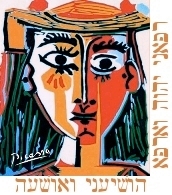
04.01.25 (Nisan 3 5785) "Those who are well have no need of a physician, but those who are sick. I have not come to call the righteous but sinners to repentance" (Luke 5:31-32). Every one of us has a "dark side" or a "shadow self" that has destructive and selfish urges. We try to conceal this truth from others (and even ourselves) but such denial doesn't change the reality within our hearts (Matt. 5:19; Jer. 17:9; Eccl. 9:3). Indeed, when we pretend to be something we are not we are more likely to be overwhelmed by dark forces hidden within us. We are most vulnerable when we think we are well, that is, when we deny our sickness our heart and minimize our need for deliverance.
Self-deception is so dangerous because it engenders double-mindedness (δίψυχος). Paradoxically if we hide the truth about the sin that "so easily besets us" and pretend that we are essentially good, we sin, as it is written: "If we say that we have no sin we deceive ourselves (ἑαυτοὺς πλανῶμεν) and the truth is not in us" (1 John 1:8). God knows that a "divided house cannot stand."
We are delivered from chaotic inner conflict when we confess the truth. "Confess your faults one to another and you shall be healed" (James 5:16). Confession allows us to acknowledge the dark passions that sometimes overmaster our best intentions. We must give ourselves permission to allow the hurt, angry, and fearful voices to be heard and sanctioned within us - and then to bring these dark and hidden aspects of our selves before God for healing. The failure to do so will split the soul and cause the hidden aspects of the self to seek "revenge" upon the "public self" that censors their message. The struggle within our hearts is real and we should attend to it seriously. Denying evil by pretending that we are okay, or by blaming others, blinds us to the truth of our ongoing need for deliverance. May God help each of us to be honest with ourselves and to confess our great need before our Heavenly Father.
But why do we have such difficulty being genuinely honest with ourselves? Are we trying to justify ourselves apart from God? Despite the fact that we may profess that we are "sinners saved by grace," we often make excuses for our failures, rationalizing that we are not "that bad," and therefore we postpone genuine teshuvah (repentance) and trifle with our spiritual lives. We do this because we feel an almost irresistible desire or "need" to excuse ourselves, to "save face" by pretending that we are not "incurably sick," or by attempting to find something about us that makes feel valuable and worthy. As H.L. Mencken once wittingly noted, "the 'truth' that survives is simply the lie that is pleasantest to believe."
The LORD wants us to be truthful (אֲמִתִי) in the "inward being" (Psalm 51:6), though that truth will cost us something, namely the facade and worldly artifice we impose through our self-deception... Opening our hearts to divine examination (בחינה אלוהית) eventually means colliding with the world of men and their conspiracies, since the godly man no longer abides their presence (Psalm 1:1-2). The Apostle Paul said that there is an exclusive disjunction between seeking the approval of men and of the approval of God: "Do I seek to please men? for if I yet pleased men, I should not be the servant of the Messiah (Gal. 1:10). Likewise we are told not to deceive ourselves (lit., "reason around" the truth, from παραλογίζομαι, from παρά, "around, beside" and λογίζομαι, "to reason") by merely hearing the truth of Scripture and not living it (James 1:22). God is not interested in "lip service" any more than he desires heartless sacrifice (Isa. 29:13; Hos. 6:6; Matt. 15:9). "Let your love be genuine (ἀνυπόκριτος, without a "mask" put on), abhor what is evil; cling to what is good (Rom. 12:9). God abhors those who pretend to know Him but who are really spiritual impostors (Matt. 7:21-23; 25:11-12; Luke 6:46).
Tragically (and paradoxically) many people can talk themselves into believing something without truly believing it, and that is perhaps the most dangerous thing of all (Matt. 7:22-23). On the other hand, some people can talk themselves into believing (or accepting) something that they know is untrue (or morally wrong), and that self-deception leads to inner fragmentation, chaos, self-delusion, and to the dissolution of the soul. A "double-minded man is unstable in all his ways" (James 1:8). As I have said before, the word translated "double-minded" is dipsuchos (δίψυχος), a word formed from δίς, "twice" and ψυχή, "soul." The word describes the spiritual condition of having "two souls" that both want different things at once -- a state of inner contradiction and ambivalence.
The Hebrew word "shalom" (שלום) means to be made whole or complete. We are to love God with "all our heart," and that means both the "good heart" and the "bad heart" as well. The temptation to sin often feeds upon hidden disappointment, anger, fear, and so on. "Mortifying" the lower nature comes by accepting the truth that God is doing a miracle in you, despite the brokenness and sin that is part of your life.
One day our salvation will be complete and we will forever be healed and filled with God's shalom. Until then we will wrestle with our faith as we trust God to transform and deliver our souls, even healing the evil within us for the praise of his Name!
Hebrew Lesson
Psalm 51:6 reading (click):
Postscript:
Dear friends, left to our own devices, we can't deal with the evil influences of this fallen world nor handle the raging impulses and fears that sometimes arise within our own sinful hearts. But take His heart and believe! Confess your need for God to fight for you, to shine his light in your darkness. Yeshua has conquered sin and death on the cross and now intercedes for you; therefore call upon his name for life - even if you need to scream out and cry! The LORD has promised to never leave nor forsake those who sincerely seek him...
Healing and Praise...
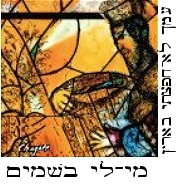
04.01.25 (Nisan 3 5785) It is good to praise the LORD despite our afflictions, since indeed, suffering itself presents an invitation to come before God in prayer (James 5:13). Suffering offers us a nisayon (נִסָּיוֹן), a test, for our hearts to be exercised in ways otherwise rendered impossible should the path of our lives be attended without real struggle...
"We rejoice in our sufferings, knowing that suffering produces endurance, and endurance produces character, and character produces hope" (Rom. 5:3-4). In other words, God allows suffering in our lives to refine us so that we trust in his salvation. "We are saved by hope," and this hope, given in God's love and empowered by the Holy Spirit, will not disappoint us or lead us to shame, but rather to the sure fulfillment of God's promises. Hope does not flail in impatience but leads to life: "Behold, I lay in Zion a stumbling stone and rock of offense, And whoever believes on Him will not be put to shame" (i.e., at peace: הַמַּאֲמִין לֹא יָחִישׁ).
In this connection I am reminded of a quote from Sadhu Sundar Singh, "Should pain and suffering, sorrow, and grief, rise up like clouds and overshadow for a time the Sun of Righteousness and hide Him from your view, do not be dismayed, for in the end this cloud of woe will descend in showers of blessing on your head, and the Sun of Righteousness rise upon you to set no more for ever" (Wisdom of the Sadhu).
It's been said that both the devil and God want your soul, but their approaches are diametrically opposite to one another.... God offers you a bitter cup that, after it has been duly tasted, will be turned sweet, whereas the devil offers you an artificially sweetened cup that, after it has been duly tasted, will be found bitter to the last of its dregs... When you accept your suffering as ordained by God - by the LORD of Glory who could easily deliver you from all trace of its presence in but the twinkling of an eye – your heartache is sanctified, and your praise becomes more dear to Him. Only the wise and loving LORD knows how bitter waters may be made sweet; only the great Refiner of our souls knows how to bring eternal beauty up from ashes... So heal me, O LORD (even if that means suffering and pain for my life), and I shall be healed; save me, O LORD (do whatever it takes to bring me to the end of myself), and I shall be saved – for you are my praise.
If you are afflicted, troubled, or in any kind of pain, you have a great opportunity to glorify your Father in Heaven by offering Him your praise.... Praising God is the appropriate response to all of reality; the affirmation of God's glory transforms everything. "Is anyone among you feeling bad? Let him pray. Is anyone feeling good? Let him sing praise" (James 5:13). Remember that regardless of how you presently feel, your emotional life is centered in the Presence of God... As George Mueller once affirmed, "Be assured – if you walk with Him and look to Him, and expect help from Him, He will never fail you."
Hebrew Lesson
Jer. 17:14 reading (click):
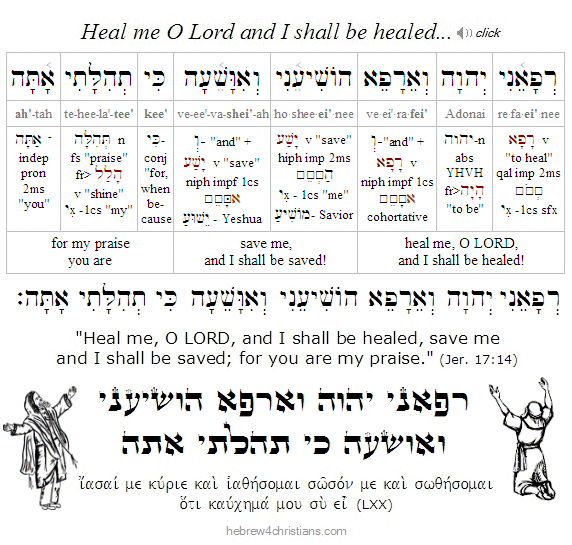 |
Torah of Sacrifices...
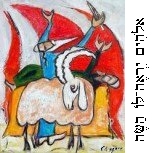
04.01.25 (Nisan 3 5785) Our Torah reading for this week (i.e., parashat Vayikra) begins with the Lord calling out (קָרָא) to Moses to explain the "laws of korbanot" (תורה של קרבנות), or the way the people could pleasingly draw near to him. Note that the root of the word korbanot, often translated as "offerings" or "sacrifices," is karov (קרוב) which means to come close, to enter into, or to approach. The korbanot, or sacrifices, were meant to bring us closer to God, and the central sacrifice at the altar was that of a defect-free male lamb offered daily, called korban tamid (קָרְבַּן תָּמִיד), or the "perpetual sacrifice." Unlike other sacrifices that may be offered at the altar, the korban tamid was continually offered by God Himself in commemoration of the great Passover redemption wherein the blood of the lamb was offered on behalf of Israel. Like the cross of Messiah our Passover (משיח פסח שלנו), God provides the Lamb and by this grace He enables access to the divine presence for blessing and eternal life...
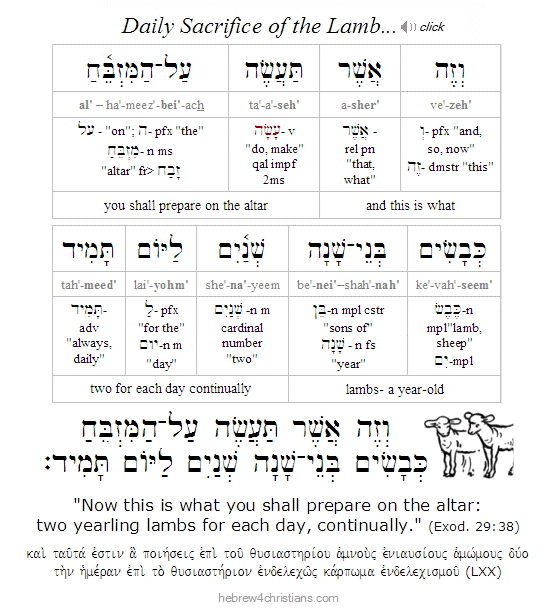 |
Other sacrifices, such as the "chatat" (חטאת) or sin offering, required the offerer to place his hands on the head of the animal, leaning on it will all his might, as he confesses his wrongdoing and expresses his desire to return to God. This procedure is called "semichah" (סמיכה) and the confession is called "vidui" (וִדוּי). Immediately following this the animal is led away to be ritually slaughtered (i.e., shechittah: שחיטה) and the blood was caught in a basin and then dashed upon the altar by the designated kohen (כּוֹהֵן), or priest.
Various other korbanot are mentioned in our reading, including the "olah" (עולה), or "ascending" offering wherein the kosher animal is entirely burned on the altar; the "shelamim" or "peace" offering (קרבן שלמים) given for celebratory events or to give thanks (תודה); the "asham" or guilt offering (קרבן אשאם) which is a type of sin offering that is more serious and involves restitution for wrongdoing. Note that for each of these offerings, if an offerer is too poor to offer an animal for sacrifice, the "minchah" (קרבן מנחה), or prepared flour offering, or the "ohf" (קרבן עוף), a bird (i.e., pigeon or dove) sacrifice was acceptable.
Note that the original Passover sacrifice (קרבן פסח) was not given to the Levitical priesthood as a sin offering, since it preceded Sinai and the giving of the various laws concerning the Mishkan/Temple sacrificial rites. In the same way, Yeshua's sacrifice was directed from Heaven itself by means of the prophetic office of Malki-Tzedek (מַלְכִּי־צֶדֶק) - a higher order of priesthood (Gen. 14:18; Psalm 110:4; Heb. 7). Yeshua both offered Himself up as the "Lamb of God" that causes the wrath of God to (eternally) pass over those who personally trust in Him, and He also offered himself as the "Goat of God" whose blood was sprinkled in the Holy of Holies to cleanse us from sin and give us (everlasting) atonement. (Other metaphors are also given in Scripture, for example, Yeshua offered Himself as a Snake lifted up (John 3:14-15; cp. Num. 21:4-9), as a Red Cow (parah adumah), and so on).
For Yom Kippur (יום הכיפורים), or the "Day of Atonement," two goats were required: one goat was for blood sacrifice in the Holy of Holies (the Goat of the LORD) and the other was used as a "scapegoat" for the sins of the community (the goat of Azazel). The Gospels emphasize the connection between Yeshua as the "Lamb of God who takes away the sins of the world" with Passover/Exodus more than the connection between Yeshua as the "Goat of the LORD" whose blood was sprinkled upon the Mercy Seat with Yom Kippur - though the author of the Book of Hebrews explicitly makes this connection (Heb. 9:11-12; 24-ff).
It may seem like the details of the various sacrifices are tedious and even boring to read, but the deeper truth of what they represent is nothing short of amazing. Yeshua as the "Lamb of God" pictures personal redemption from slavery to Satan and freedom from the wrath of God. This is the greater Passover/Exodus connection. By means of Yeshua's shed blood and broken body, the wrath of God passes over us and we are set free to serve Him.... Yeshua as the "Goat of God" pictures both personal cleansing (i.e., "propitiation" or "expiation" for our sins: the Greek word (ἱλαστήριον) is used in the LXX for the kapporet (Mercy Seat) in the Holy of Holies which was sprinkled with the blood of the sacrifice on Yom Kippur) as well as national teshuvah and cleansing for ethnic Israel at the end of the Great Tribulation period. At that time Yeshua will function as Israel's true High Priest whose sacrifice is applied for Israel's Atonement. This is the Yom Kippur connection.
Hebrew Lesson
Psalm 4:5 reading (click):
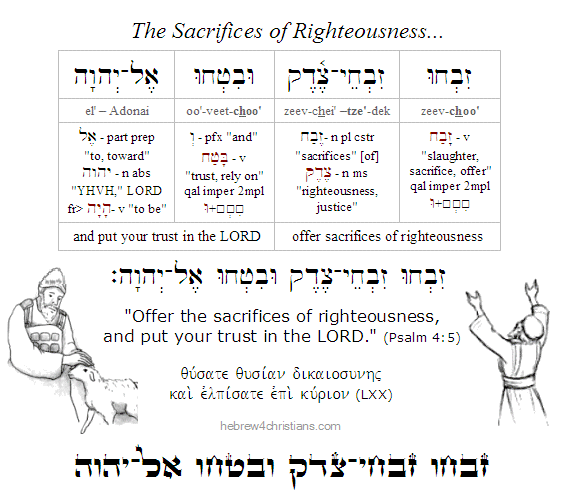 |
<< Return
|
|





![Spring Holiday Timeline (H4C]](../../../../../About_HFC/Site_News/Archive-2025/April/April_2025_H4C_Overflow/shabbathagaolline.gif)



